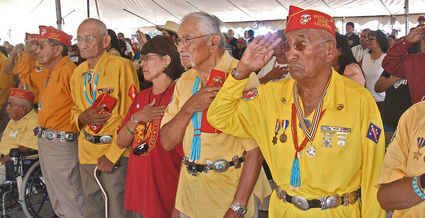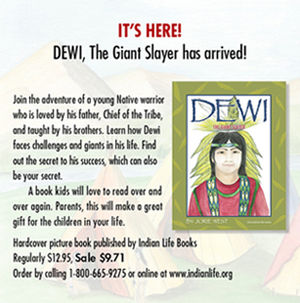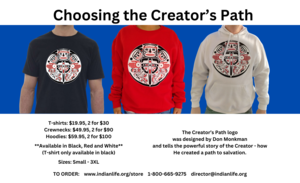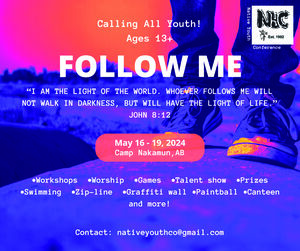Inertia
Last updated 3/31/2015 at 7:57pm

Kirtland Air Force Base
North America's Indigenous Peoples have served in every war since the American Revolutionary War and the American Indian War all the way up until the present day. In fact, more Native soldiers have served than any other people group. There is a heavy price and Native veterans never seem to get the credit or benefits they deserve. As in this short story, this couple paid dearly for this soldier's time in Vietnam.
"I know what it is like to lose your tongue, husband," I whisper into Joe's left ear. I remember that ride from Oklahoma to North Carolina, my too-long legs curled into the metal wall of the bus. I rocked myself against the stained plastic seat and pretended that my church dress and red hat were for something other than being banished from home. Mile after mile, my tongue cleaved to the roof of my mouth, but inside, where it mattered, I was screaming.
"You are screaming on the inside," I tell my silent husband over dinner. I reach over and pat his hand. "You do not think that I would know, because I have never been to war. But I do not have to go to Syria or Vietnam to know what it is to lose my mind."
"Ama," my husband grunts. That's the kind of good my husband was. Here he is Creek, but he took the time to learn as much Cherokee as he could. Handing him the salt, I place another piece of selu gadu, cornbread, on the edge of his plate.
Since he has been back from Vietnam, my husband has broken every glass dish in the cupboard, even the ones that belonged to his mother. I don't mind; better to break dishes than people or promises. I get up early, drive our old truck to rummage sales over by the highway. I buy plastic plates and a set of Tupperware, only missing one lid, for three dollars. The plates are ugly, ribboned with rows of simple-looking daisies that vex me something awful. Yet they do not shatter, no matter how far they are thrown.
"Nuna?" I add mashed potatoes to his shrinking serving. If I cannot help my husband, the least I can do is feed him. Whatever part of his mind is twisted and damaged by his time in the desert, his appetite is okay. His appetite for food, that is. He does not notice, much less want, me.
Many women would rejoice in a quiet husband, one who stays home nights and whose sole vice is smashing dishes into shards. I am different. My husband once listened to me dream our lives without nightmares or wars. My husband whittled tiny crosses out of kindling and put them in mailboxes up and down the road. My husband liked me.
"You're too pretty for here," my husband said when I walked into our front room the last Sunday before he shipped out, dressed for church. "I expect we'll be getting a notice from out in Hollywood any day now."
"I won't go," I laughed, tumbling into his lap. "Not unless you go and manage me."
"Oh I can't," he laughed back," or who's going mind the baby?"
I winked at him. "What baby?"
"That little girl we're going to have. Prettier than ten thousand stars. Like manna from heaven. I'll have to take both my girls out West to Hollywood to be in pictures."
I leapt up, a little bit miffed. "Why only one?"
My husband reached up, clasping my waist. He set me on the end of his knee.
"So I don't ever lose count nor have one I think I can spare."
He squeezed. I hung on for my life.
The army sent somebody named Joe Turner back from Vietnam. They lost my husband somewhere along the way.
I am sleeping when my husband finally speaks of Vietnam.
"Indiana, I should never have gone." His voice is soft, but I wake up, right fast, thankful to hear him call my name. I want him to know that I hear him, want him to keep talking. I reach for his broad back, placing the palm of my right hand in its muscular center.
"Indiana, I should have run. Should have hid out on the Powwow circuit, gone joined myself to the rodeo. Something..."
"You don't run. It's not in you. You see how brave you are. All those medals..."
He shakes his head. "No, Indiana, nothing scares you. You never run from anything."
"I wanted to. The whole time I was riding here from Oklahoma, I thought about jumping out of the bus, rolling onto the road, running away. Before you came, I used to dream running. Wake up and my feet were just going."
I scoot myself toward him and put my head against his shoulders.
"It's not the same," my husband insists. He is right and we both know it. I kiss his shoulder and he straightens. The scent of him, the smell of earth and smoke and sweat, stirs me. Kissing his shoulder again, I wrap him in my arms.
My husband kisses the palm of my open hand. He folds my hand into his own. "Indiana, those medals...those medals are for shooting men who looked like Dad Turner, Samson Grayson, or Nat Junaluska down the road. There were an army unit of boys who should've been at home eating cornbread and collard greens with their mamas and we got off and shoot at men, children really, who are us only they live in Vietnam and not Oklahoma or Georgia or Alabama or North Carolina. It dawns on me that if I lose my dog tags, or get hit in the head and can't remember my serial number, I'm a goner. There's no difference between me and the guys I'm killing except they got to keep their long hair. "My husband turns to face me. His dark eyes are wet and tormented.
"There's no difference. No difference at all."
"You are different. You are good and gentle and brave and kind. You went where they sent you. You did as you were told."
My husband widens his eyes. He gasps, swallowing a sob. I must keep talking, telling what he must take as truth.
"You are a Baptist," I breathe earnestly, "you work hard and nobody, not even my own daddy or Carolina was better at breaking a colt." My husband shuts his eyes tightly, tears seeping from the corners.
"You used to love your wife pretty well." I run my fingers along his chain, "I bet you still remember how to do that."
My husband smiles slightly, the left corner of his mouth tugging itself upward.
"If you hadn't rescued me, I'd probably be in the ground instead of here, in love with you," I tell him. My little toe still bends from Mama's shoes. When it rains, that toe aches, a sure, slow throb way down in the bone.
My grandparents were good people. So good, they let me keep their name. Big Mama and Grandaddy took me to church, tried to teach me to live right. I reckon they did the best they could. Without my husband, there's no telling.
I lean over and kiss him on the cheek. He kisses me back. Twice. Pulling him into my arms, I kiss his temple, his forehead, the crown of his head.
"Make me a promise," he sobs.
"Anything."
"Stay out of Hell. No matter if they call it patriotic, heroic, or whatever, don't you go. If I end up there, don't you join me. Promise me that."
I promise. Aside from his kisses, that's the last thing I remember.
Adapted from THE WAY WE MADE SENSE by Dawn Karima Pettigrew, Ph.d. Published by Aunt Lute Books.











